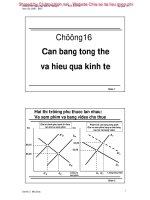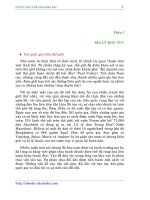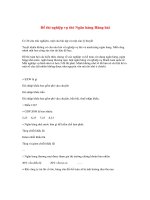The admiral
Bạn đang xem bản rút gọn của tài liệu. Xem và tải ngay bản đầy đủ của tài liệu tại đây (1.48 MB, 337 trang )
TheProjectGutenbergEBookofTheAdmiral,byDouglasSladen
ThiseBookisfortheuseofanyoneanywhereatnocostandwith
almostnorestrictionswhatsoever.Youmaycopyit,giveitawayor
re-useitunderthetermsoftheProjectGutenbergLicenseincluded
withthiseBookoronlineatwww.gutenberg.org/license
Title:TheAdmiral
ARomanceofNelsonintheYearoftheNile
Author:DouglasSladen
ReleaseDate:January11,2015[EBook#47944]
Language:English
***STARTOFTHISPROJECTGUTENBERGEBOOKTHEADMIRAL***
ProducedbyShaunPinder,SamW.andtheOnlineDistributed
ProofreadingTeamat(Thisfilewas
producedfromimagesgenerouslymadeavailablebyThe
InternetArchive)
Transcriber’sNote
Misspelling in quoted matter (journal entries, correspondence, etc.) is
preservedasprinted.Furthernotesmaybefoundattheendofthetext.
SecondEdition.
TheAdmiral
ARomanceofNelsoninthe
YearoftheNile
By
DouglasSladen
Authorof“AJapaneseMarriage,”etc.
Alawuntohimself
London
HutchinsonandCo.
PaternosterRow
1898
NOTE.
The cover is an exact reproduction in the original colours of a rare old print.
Thedateshaveofcoursebeenadded.Theclouds,towhichNelsonpointswith
hissword,expressthewarsandrumoursofwars,withwhichtheyear1798was
overhung.Theswordindicatesthespiritwithwhichheapproachedquestionsof
nationalhonour.
PREFACE.
SOME years ago, Professor J. K. Laughton’s admirable selection of “Letters
andDispatchesofHoratio,ViscountNelson,”inspiredmewithsuchaninterest
in Nelson’s wonderfully human and graphic correspondence that I studied the
larger and earlier “Dispatches and Letters of Lord Nelson,” collected by Sir
HarrisNicolas.Thepresentbookistheoutcomeofalongandaffectionatestudy
ofthesetwoworks,andthewell-thumbedpagesofSoutheyandJeaffreson.
Butsince,atthetimeofmyfirstvisittoSicily,alittlemorethantwoyearsago,I
had definitely before me the project of writing a Nelson novel for the onehundredthanniversaryoftheBattleoftheNile(August1st,1898),Ihaveread
mostoftheimportantworksdealingwithLordNelson’slife,especiallyCaptain
Mahan’s “Life of Nelson,” which is a monument of impartiality, research, and
the application of professional knowledge to literature. I have also, by the
kindnessofLordDundonald,Mr.Morrison,andothers,hadtheopportunityof
seeing a quantity of unpublished Nelsoniana, which have been of the utmost
valuetomeinformingafinalopinionofthecharacterofmyhero.
The main object of this book is to present to the reader, in the year of the
centenaryoftheNile,therealNelson,withoutextenuationormalice.Nodoubtit
wouldhavebeeneasiertoensurepopularitybypassingovertheweaknessesin
his character and representing him only as an ever-victorious warrior. But this
didnotseemtometherightcoursetopursuewithacharacterlikeNelson.Those
who have studied his letters in the pages of Nicolas and Laughton, and those
who have studied his life in the pages of Captain Mahan (who, it must be
remembered,isaprofessionalwriter,thechiefnavalexpertoftheUnitedStates,
writing upon the greatest English sea-strategist), cannot fail to have been
impressedbytheintenselyhumannotewhichhestruckinalmosteveryletter.
People love to read about Nelson, not only because he was the greatest seacommander who ever lived, but because his own personal character was so
extraordinarily vehement and interesting. He was a law unto himself. As a
commander he forced his way into recognition by detecting, and acting in
defiance of, the errors of his superiors, even of men like St. Vincent. He
continued to do so when he was an Admiral commanding fleets whose
destructionwouldhavemeantalmostnationalruin.Andhewasasmuchalaw
untohimselfinhisprivatelife.“Alawuntohimself”mighthavebeenhismotto.
Itwasthekeynoteofhisforce.
But even Nelson, absolutely fearless as he was of danger and responsibility,
couldhardlyhaveextortedthelibertytoassertthisforceofcharacterifithadnot
beentemperedbyoneofthemostlovabledispositionsrecordedofapublicman.
Nearlyallwhowereeverthrownintocontactwithhimwerehiswillingslaves,
oraffectionatefriends—eventhegrimoldSt.VincentandtheaustereHood.He
wasthemostconsiderate,themostsympathetic,themostgenerousofshipmates.
His very simplicity was fascinating, and he was wonderfully simple where his
affections were concerned, though he showed such intuition in gauging the
character of a knave or an enemy, and in forecasting the movements of
politicians,aswellasofhostilecommanders.
Nelsonhadthesamefaithinthosehelovedashehadinhisowngenius.Inthe
hourofdangerhisspiritrosetothesublime,andthebodilyailmentstowhichhe
wassoconstantlyaprey,lefthim.Inthehoursofwaiting,whenanxietieswere
accumulatingandactionwasimpossible,hisstateofhealthsankverylow.His
passion for Lady Hamilton shows how infatuated he could become over a
womanwhoappealedtohisimagination.Fewwomeninhistoryhavepossessed
her great qualities in a higher degree than Lady Hamilton at the time when
Nelsonfirstcameunderherinfluence,in1798,aftertheBattleoftheNile.Her
letterstoMr.GrevilleandSirWilliamHamiltonprovethatshemusthavehada
delightful disposition, and the part she took in the stirring events of 1798 and
1799showsherimagination,herdaring,andherability.
I have endeavoured, at the risk of raising a stormy discussion, to present the
characterofNelsonexactlyasitwasin1798andthefirsthalfof1799;andto
present a general view of the historical events in which he formed the central
figure, though I am aware that certain passages in the book, such as Chapter
XVII.,formratherheavyreadingforanovel.But,tobringoutthecharacterof
Nelson,itwasnecessarytodetailthetangledpoliticalproblemswithwhichhe
was confronted. As Captain Mahan pointed out, Nelson was one of the most
astutepoliticiansofhisday,aswellasthegreatestsea-commander.
AlargepartofthebookisinNelson’sownwords.Appreciatingtheimportance,
in treating a national hero, of keeping as close as possible to history, I have,
wherever it was feasible, used, whether in dialogue or description, the actual
words of Nelson and his contemporaries. These I have derived from his own
publishedandunpublished correspondenceandjournals, from thenarrativesof
hisofficers,andsimilarsources.Similarly,Ihavederivedmychapteronhisvisit
to Pompeii largely from an account of a visit to Pompeii written in 1802. The
style of the narrator of the story, Captain Thomas Trinder, is founded upon
unpublishedjournalsandlettersofthetime,inthepossessionofmyfather.They
weremostlywrittenbyhisgodfather,Mr.HenryBrooke,wholivedatWalmer,
and may be taken as fair specimens of the writing of the travelled and bettereducatedKentishgentlemanofhisday.Mr.Brookewasoneofthelastheadsof
the now abolished Alien Office, and as such had much to do with the French
princesexiledinEnglandduringtheNapoleonicrégime.Hewasalsopresentat
the restoration of the French monarchy. Some of the pieces of queer grammar,
such as “I have wrote,” were probably idiomatic at the time, others are mere
loosewriting.
The scene of the book is mostly laid in Naples and Sicily, and to acquire the
requisitelocalknowledgeIhavepaidtwolongvisitstotheseplacesin1896-8.
The Mont’ alto Palace and the Castle of the Favara, in fact nearly all the
buildingsdescribed,actuallyexist,thoughinmostcasestheyaremuchdecayed
or altered. The Hamiltons’ Palace at Naples, though now divided into
apartments,remainsmuchasitwas,exceptthat,inNelson’stime,theseacame
closeuptoit.Thefeaturesofthesea-frontofNaplesareverymuchalteredsince
then; but the Comte de la Ville, who is at the head of the Storia Patria, the
excellent historical society of Naples, was kind enough to show me almost
contemporary plans of the places described. And here I wish to take the
opportunityofpointingoutthattheNeapolitansandSiciliansofto-daydifferas
muchfromthecorrupthangers-onoftheBourbonsastheEnglishpublicmenof
to-daydifferfromthevenalfollowersofSirRobertWalpole.Ineedhardlysay
thatthedenunciationsofthem,andabovealloftheFrench,arenotmyown,but
alwaysderivedfromNelson’sexpressedsentiments,andnearlyalwaysgivenin
hisexactwords.
In criticising the characters of my heroines it must be remembered that the
moralsoftheNeapolitancourtinthetimeofMariaCarolinaareindescribablein
anEnglishnovel;butthis,asamatteroffact,istheonepointinwhichIhave
shrunkfrompresentingthingswithoutextenuation.Itwillbenoticedthatatthe
period of which I write, the year of the Nile, I believe Lady Hamilton to have
been a lovely and enchanting woman, and that I believe that the connection
betweenNelsonandherbeganasapureromance,eachworshippingtheotheras
themostsplendidhumanbeingintheworld.Thebeautifulletterofhero-worship
which she wrote to him after the battle of the Nile I first saw in its entirety in
ProfessorLaughton’ssumptuousvolume,“TheCompanionsofNelson.”
BeforeIconcludeIhavetoexpressmythankstoMr.E.Neville-Rolfe,British
ConsulatNaples;totheMarquisA.deGregorio,andtheMessrs.Whitaker,of
Palermo;andtoMissA.Mason,agreat-nieceofNelson,besidesthosewhomI
havementionedabove.IamalsoindebtedtothewritingsofMr.ClarkRussell;
to the highly valuable and hitherto unpublished Nelson documents which have
been appearing in Literature; to the accurate and splendidly illustrated
NelsonianawhichhavebeenappearinginthepopularillustratedServicepaper,
TheArmyandNavyIllustrated,andintheEnglishIllustratedMagazine;andto
Lord Charles Beresford’s and Mr. H. W. Wilson’s “Nelson and his Times,”
which was published as a supplement to the Daily Mail. I have followed Lord
Charles’sviewofNelsonhimself morecloselythan anyother,because itisso
sympathetic,andiswrittenbyonewhoisatonceabrilliantnavalexpertandthe
sea-commandertowhomthenationlooksforexploitslikeNelson’s.
Iampreparedformuchcensureandacrimoniousdiscussion,especiallyoverthe
verypointuponwhichItakemystand,thatanoveldealingwiththecharacterof
Nelsonoughtaboveallthingstobeahumandocument.Heis,tome,themost
intenselyhumanfigureinHistory.
DOUGLASSLADEN.
PALAZZOMONTELEONE,PALERMO,
April6th,1898.
CONTENTS.
PROLOGUE.
INTRODUCINGTHEREADERTOTHELADYKATHERINE
FLEET
PAGE
1
CHAPTERI.
OFTHEFINDINGOFLORDNELSON’SJOURNAL
11
CHAPTERII.
INTRODUCINGTHEADMIRAL
19
CHAPTERIII.
OFTHELETTERSOFABOYANDAGIRL
28
CHAPTERIV.
OFOURENTRYINTOSYRACUSE
31
CHAPTERV.
INWHICHWILLHASHISFIRSTCHANCE,ANDHISFIRST
ESCAPADE,ANDHISFIRSTMEETINGWITHTHEPRINCESS
OFFAVARA
CHAPTERVI.
37
ATTHEFOUNTAINOFCYANÉANDTHEPAPYRUSBEDSOF
THEANAPO
52
CHAPTERVII.
SATISFYINGAPRINCE’SHONOUR
63
CHAPTERVIII.
OFTHEBATTLEOFTHENILE,ONTHEFIRSTOFAUGUST,1798
76
CHAPTERIX.
HOWTHEADMIRALBEGANHISFRIENDSHIPWITHLADY
HAMILTON
101
CHAPTERX.
WHATHAPPENEDATTHEBALLGIVENBYLADYHAMILTON
INHONOUROFTHEADMIRAL
112
CHAPTERXI.
HOWTHEADMIRALENTEREDTHEMAZEOFNEAPOLITAN
POLITICS
127
CHAPTERXII.
OFAVISITTOPOMPEIIIN1798,INWHICHTHEREWERE
LOVERS,ANDOFTHESUPPERINTHEINNATRESINA
139
CHAPTERXIII.
OFTHESUPPERATTHEPALACETHATFOLLOWED
CHAPTERXIV.
166
WHATTHEADMIRALWROTEOFMYLADYINHISJOURNAL
181
CHAPTERXV.
OFTHEVOYAGETOMALTA,WITHTHEACCOUNTOFWHAT
HAPPENEDATCASERTA
191
CHAPTERXVI.
WHATTHEADMIRALWROTEINHISJOURNALABOUTLOVE
213
CHAPTERXVII.
WHICHTHEIDLEREADERMAYSKIP,ASPOLITICS.ITSETS
FORTHTHECOWARDICEANDUNRAVELSTHEINTRIGUES
WHICHLEDTOTHEFALLOFNAPLES
227
CHAPTERXVIII.
HOWTHENEAPOLITANSDECLAREDWAR,ANDHOWTHEY
WAGEDIT
257
CHAPTERXIX.
HOWTWOMILLIONSANDAHALFOFTREASUREWERE
SMUGGLEDFROMTHEPALACETOTHEBRITISH
AMBASSADOR’S
265
CHAPTERXX.
HOWTHEVANGUARDTOOKTHEROYALFAMILYTOPALERMO
INTHEGREATESTSTORMTHEADMIRALEVERKNEW
288
CHAPTERXXI.
HOWWILLWASENTERTAINEDBYTHEPRINCESSATHER
PALACEOFTHEFAVARA
309
CHAPTERXXII.
HOWALLEUROPEWASATSIXESANDSEVENS
321
CHAPTERXXIII.
OFTHELOVEOFTHEADMIRALANDMYLADY
334
CHAPTERXXIV.
HOWTHEADMIRALWENTTOTHEFAVARA,ANDTHE
PROPHECYBEGANITSFULFILMENT
346
CHAPTERXXV.
HOWTHEADMIRALTOOKNAPLES,ANDOFTHEHANGING
OFCARACCIOLO
365
CHAPTERXXVI.
OFTHESTRANGEPLIGHTINWHICHWILLFOUND
KATHERINE
386
CHAPTERXXVII.
OFTHEDEATHOFDONNARUSIDDA,THERESURRECTIONOF
CARACCIOLO,ANDTHEHAPPYENDING
404
THEADMIRAL
PROLOGUE.—IntroducingtheReadertotheLady
KatherineFleet.
MY Lord Eastry belonged to the grand old race of East Kent squires, who
broughtuptheirsonstofearnothingandhatetheFrench,aye,andbroughtup
theirdaughterstobethewivesandmothersofmenwhoshouldsailthesaltseas
tilltoostiffwithageorwoundstoclimbtotheirquarter-decks.Forhowcould
theirsonshelpgoingtoseawhentheysawtheboatmenofDealfromtheiropen
beach defying the guns of the French and the might of the fiercest storms that
blew?
MyLordEastrybeganhisboldlifeasyoungersonofasquire,whoboretheold
Kent name of Fleet. But of John Fleet, the eldest, there is only an empty
memorialinEastryChurch,whichrecordsthat“hisbodyliesinthegreatSouth
Seasinthehopeofajoyfulresurrection.”Hisship,fullofhonourandgloryand
prize-money,wasspokentwodayseastofTrinidadinthegreatstormof1759;
and mariners maintain that fighting Jack Fleet’s black frigate sails there still,
wheneverthecycloneiscomingdown,withcanvasenoughonhertooverseta
hundred-gun ship. And Dick had his call on the glorious 1st of June—had the
van-shipandsailedintotheFrenchwiththegrandairofhisfamily,asifhenever
couldhavehisbellyfulloffighting—laidalongsidehalfadozenofthematone
time and another, and had a chain-shot through his middle just as he sent the
Vengeurtothebottomwithhercoloursintheactofstriking.Oncehewashard
pressed, though; and Harry, the Lord Eastry that, as he lay dying, drank
Wellington’shealthwhenthenewswasbroughtofWaterloo,sawitand,leaving
thelineflatinneglectofsignals,boreuptohim.Lord!whatafamilytheywere
tofight!WhenthetallRamilliesraninbetweentheBrunswickandtheAchilleto
receiveherfire,itwaslikeanexplosionofdevilsfromhell.Themen,menofthe
CinquePortsthatallhadadeadfatheroradeadbrothertochargetotheFrench,
wouldhavefollowedJack,Dick,orHarryintoNebuchadnezzar’sfieryfurnace.
Well, Harry Fleet—the Lord Harry, as they called him in the Channel—came
safeoutofthegreatbattle;andnotsomanymonthsafterwardsfelluponagreat
convoyguardedbyshipsthatshouldhaveblownhissquadronoffrigatesoutof
the water, drove their escort under the guns of Martinique, and carried the
convoy,withthearmyonboardthemthatshouldhavetakenourIndies,safeinto
Antigua,fromwhichhebroughthomemoreprize-moneythanever.Hewasjust
toolatetoclosetheeyesofhisfather,thetougholdsquireofEastrywholived
hisfourscore-and-oddyearslikehisfathersbeforehim,thefewofthemthatdid
notdiewiththeirshoesonandtheflagoverhead.
They made him the Lord Eastry and a Knight of the Bath, but he had had so
muchleadthroughhislegbythattime,thathecouldneverfightashipagain,so
hecametotheoldhomeatEastrytofindhisfourteen-yearolddaughterthemost
wonderfulbitofwoman’sfleshinallthehallsofKent.CaptainJackandCaptain
Dickwerenevermarried.Whatchildrentheymayhavehadfellnotintoanylist
ofthelandedgentry,andsoitcamethatthelong-descendedlandsoftheFleets,
andAdmiralmyLordEastry’sprodigiouscoffersofprize-moneymustallcome
toKatherineFleet,nowtheLadyKatherine.
Now,nomanthateverbreathedwaslessofacoxcombthanAdmiralHarry,but
asthenameofhisancientfamilywastopassoutoftheearthwithhisdeath,he
lookedtoitthattheson-in-lawwhosucceededtohishonoursandhisgreatestate
shouldbeofsuchrankandfamethatitmightbenoregretevenfortheFleetsof
Eastrytobelostintheirgreaterhonours:someDukeitmightbe,oratleastan
Earl, whose belted ancestors had fought for the White or Red Rose; and
Katherine Fleet, aged now eighteen, might have had any such an one as came
withinthemagicofhermoods.
There are some women who are not completely graceful, and yet give the
onlooker a great sense of satisfaction. There is a sort of wild freedom, a
declarationofstrengthandhealth,anevidenceofcourageandhighspirits,which
bespeakananimalperfectiontoointenseforthegentleeaseofgrace.Katherine
wasoneofthosemettlesomewomenwhomakemen’sbloodtingle,andwhose
own red blood never runs cold in the direst peril. I suppose she was tall. She
would have looked it had she been more than common short. She was such a
noblecreature,andshehadthesameblueeyesthatwereworthadozenpikesto
the Lord Eastry, when, in his old frigate days, he had jumped aboard a
Frenchman and a wave had checked half his boarding party—gay blue eyes
withal, that could laugh like her dimples and white teeth—gay blue eyes that
couldbeaslovingorrecklessasthemobilemouth.Andshehadthepurecurves
ofcheekandeyebrowwhicharealmostnecessarytobeautyabsolutelikehers.
What follows, I, Thomas Trinder, Captain retired on half-pay in His Majesty’s
Navy, and now of Beach Cottage, Walmer, who am writing this chronicle, had
fromWillthenightbeforeIledhissistertoRippleChurch.
One March night of 1798 was Katherine’s coming-out ball. And her father’s
hopes looked like fulfilment, for the greatest of Kentish peers, the young
Marquis of Dover, had been spending week after week at his mansion of
Pegwell,whereneverwithinthememoryofthecountryside,whichnotedallhis
doings,hadhespenttwodaysonend.AndKatherineinaball-roomwasawitch.
She danced as such women do, light-footed and tireless, radiating health and
highspirits,andwiththeunconscioussmileofconquestontheirlips,untilthe
victorcomeswhomakesthemreplaceitwiththemostexquisitegentleness.
People looked to see that in Lady Katherine, before the night was dead, for
Ralph, Marquis of Dover, Earl of River, Viscount Ripple, and Baron
Waldershare,allinthePeerageofEngland,andLordLieutenantoftheCounty
of Kent. For he was a fine man, who rode straight to hounds, and had already
climbedhighintheGovernment,andKatherinehadshownherselfwellinclined
tohim.
The great minuet was to be at midnight, and Katherine was promised to Lord
Dover for it. In his fine scarlet uniform of Lord Lieutenant, he was already
waitingforherinthedoorofthegreatbarnwithtranseptslikeachurch,which
had been turned into a ball-room, decked with the trophies of Lord Eastry’s
wars.
Forinanothertwoorthreeminutesthefirststrokewouldclangfromthetower
ofEastry’slittleNormanchurch.Katherinehadbeenuptoherroom,—shehad
girlishvanityenoughtowishtolookherbestinthegreatminuet,—andnowshe
was stepping down the stairway with an eloquent hesitancy, her left hand
clearing from her lovely feet the heavy shimmery satin, which, young as she
was, it seemed natural for such an imperial woman to wear. Dividing the line
betweenherbeautifulthroatandhershoulders,werethefamouspearlsthatwere
thetrophyofLordEastry’swildestexploit.
Who could doubt but that when she went out from that minuet, it would be to
havethegreatestnameinallthekingdomofKentofferedforherkeeping?
Butsuddenly,throughtheopen,ivy-shroudedElizabethanpaneattheturnofthe
stair,camealowvoice,—ayoungvoice,withthelowdistinctnesswhichIshall
neverforget,—“KittyFleet,KittyFleet,isityou,KittyFleet?”
A light came over the girl’s face, which, I am prepared to swear, the great
MarquessofDoverhadneverseen,asshereplied,
“Hush,Will!keepintheshadow,andI’llcome—butonlyforaminute.”
But,insteadofdoingasshebadehim,hecamerightintothedoor,—intothefull
blaze of light. He was then a fair boy of eighteen, and I can tell you that his
charmingfigurewasshownofftogreatadvantagebythequaintdressofourday,
—thetight-fittingNankeenhoseandshortdarkbluejacket.Andwhenhebared
hisheadheshowedfairhair,asglossyandgoldenasKatherine’sown,inavery
long queue. I can picture him fidgeting with his sugar-loaf beaver, for he had
somethinggreatonhismind.
“Oh,Will,”shewhispered,“weshallbediscovered.”
“Nomatter.”
“But why?” began Kitty; and suddenly prepared to fly, as the first stroke of
twelverangoutpainfullycleartoheranxiousear.
“I’mgoingwiththeAdmiral,Kitty,andyouknowwhatthatmeans.”
“Yes,—thatis,whatdoesitmean?”
“Itmeans,—well,it’sAdmiralNelson:anditmeansthatIshallnevercomeback
atall,orcomebackaman.”
“Whendoyoustart,Will?”askedKatherine,forgettingallabouttheminuetand
hermarquess,andcomingforwardtotakehishandsandlookintohisface.At
eighteenitwasabeautifulface,buteventhensoproudthatitsnaturalfrankness
wasalmostobscured.Andyetyouforgaveitshaughtiness,foryoufeltthatsuch
pride would not stoop to anything cowardly or mean, anything that would
preventitskeepingitselfaloofandaloft.AsshetookhishandsinhersIknow
howthestern,clean-cutmouthmeltedintooneoftheirresistiblesmilesthatsuch
mouthsmostlyhaveonceinaway.
“Oh,Will!”shesaid,“Iwaswonderingwhydidyounotcometomycoming-out
ball—you,Will,mybestfriend.”
“To see my Lord Dover’s triumph when he had won you, Kitty?” he asked
almostbitterly:“Icouldnotbearit.No,IshouldnothavecomeatallifIhadnot
beengoingbythemorningcoachwithmymothertoPortsmouth.”
“Why,Will,whatisLordDovertome?”sheasked.
“Hemeanstomarryyou.”
“Idon’tmeantomarryhim.”
“Butwhatwillyourfathersay?”
“Myfatherwillsaynothing.Ihavenoneedtomarrythefirstloverwithatitle
whopresentshimself.Iamalord’sdaughter,passingrich—andpassablygoodlooking,Will?”
“Beserious,Kitty.”
“Indeed I must, and say good-bye, Will,” she cried, as the strokes had ceased
ringingoutfromEastryTowersometwoorthreeminutes,“fortheminuetwas
fortwelveo’clock,andIamengagedtoLordDover—forthatonly.Good-bye,
dearWill.”
With a sudden impulse she sprang forward, and laying her hands on his
shoulderskissedhim.
Hardlyhadshefinished,when—
“What’sthis,what’sthis?”criedabluffvoice,withanaccompanyingthudofa
lame man’s stick on the polished oak floor—“Will Hardres off to fight the
French!Nay,lad,notsosudden!thecoachdoesnotstarttillsix,andCissy’sat
school,andyourmothergoingwithyou.Thisway,thisway!”
HeledWillintotheball-roomanduptotheMarquess.
“I have a favour to ask you, my Lord Dover. I wish Will Hardres here,” the
noblemanbowed,“toleadtheminuetwithmydaughter.WeFleetsthinkitthe
greatesthonourintheworldtofighttheFrenchinaKing’sship;andWillisto
havethespecialhonourofsailingwithAdmiralNelson—agreaterman,tomy
mind,thanSt.Vincent,orHood,orHowe.”
“Asyouplease,”saidtheMarquess,insuchachillingwaythatWill,ashesaid,
couldhavekilledhim,andIknowthekindoflightwhichcameintoKatherine’s
eyes.
“IcannottakemyLordMarquess’splace,”saidWill.
“Then, by G—d, you shall take my daughter herself, if she’ll have you,” said
Lord Eastry, more thoroughly roused and vexed with himself for the slight he
hadputupontheMarquess.
“ByG—d,heshall,ifhe’llhaveme,”saidKatherine,alsoroused,andusingher
father’snotveryelegantlanguage.
PoorWill,theverypatternofgoodmanners,whichwerewellnighallthathis
widowed mother had to bestow upon him, was dumfounded. In a moment of
piqueKatherineandherfatherhadbestowedherhanduponhim—thatwhichhe
coveted more than anything else in the world, and dared not covet; and the
bestowalhadbeenmadeinamannerandlanguagesoextraordinarythathewas
atalosshowtoeffecttheacceptance.
ForthemomenttheMarquesscametotherescue.
“IthinkIamtohavethehonour—fortheminuet.”
It was not natural to Katherine not to be gracious; and she had months of
rememberedkindnessestothisman’scredit.Indeedshehadcomewithinanace
ofthinkingofhimasherhusband.Sosheacceptedthesituationwithwomanly
tact,sheafterwardsmaintainingthatshespokeaslittleasshemight.
She danced the minuet with grave sweetness and gentleness, which, in a
mischievousgirllikeKatherine,whowaslittlemorethanachild,was,initself,
anominoussignfortheMarquess.
Shealsocastfromtimetotimeatenderglance,aspeakingsmile,toWill.
“It seems to me,” said his lordship, bitterly—he could not be chilling to
Katherine,whohadhisheart—“thatyouaresteppingwithme,anddancingwith
thatboy.”
“I am but lately affianced to him, my lord,” retorted Katherine, this time with
mischiefinhereyes.
“You don’t mean to say that you’re taking this tomfoolery seriously, Lady
Katherine—Kitty?”
“Itisnotomfoolerytome,mylord,”shesaid,withaflashofrisingangerthat
warnedhim.“Ihadkissedhimmylove,beforeyounettledmyfatherintogiving
metheleavehemightneverhavegivenotherwise.”
Bythistimetheminuetwasover,andKatherinehadsufferedherselftobeled
intooneoftheaislesofthebarnwhichhadbeenriggedintoaball-room.
“Oh, Kitty,” cried the Marquess, with a change of tone, which made her
woman’sheartgentletohim,“Iwon’tcallitthatnameagain,becauseitmakes
youangry;buttellmethatyoudidnotmeanitseriously,foryouknowIhave
loved you three months past, and been waiting for the opportunity you have
alwaysfencedoffwithsomejestorpieceofmischief.”
“Andcouldyounotguesswhy,mylord?”
“Why?”heechoed,sadly.
“BecauseIknewIdidnotloveyouhonestly,and,warmlyasIlikedyou,Iwas
waiting to see if I could love you. You may rely on it, that when I felt myself
conquered, I should have thrown down my weapons and surrendered at
discretion.”
“Andcanyounotlovemeyet?”
“Nevernow,mylord,morethanafriend.”
“Whysosuddenly?”
“Why?Becauseeventshavebeenlikerunawayhorsesto-night.Theyhavetaken
thebitsbetweentheirteethanddashedusoveraprecipice.”
“Againstyourwill?”
“Nay,notagainstmywill;butitwasaleapImightneverhavedaredtotake.”
“Andyoumeantomarryhim,Kitty?”
“Yes,mylord;whenheisaman.”
“Andwhenwillthatbe?”
“I know not; but manhood comes quickly in these piping times, and lives are
short,”sheadded,withalittlebreakinhervoice.
“Andhegoestoseato-morrow?”
“Itisto-day,”sheanswered,withabiggerbreak.
“ThenIamanillfriendtobekeepingyoufromhim,”hesaid,hisbetternature
assertingitselfatthesightofthesorrowofthewomanhelovedsowell.“Goodbye,Kitty,”hesaidgravely,bowingtokissherhand.
“Good-bye,mylord.Youarenotangrywithme?”
“No; not with you. Not angry, but hurt, and heart-sick. You will be my friend
still,littleLadyKitty?”
“Iamfivefeetsix,LordDover.IsthattallenoughtobethefriendofaMarquess
andtheLordLieutenantofKent?”
“Itistallenoughformyheart,Kitty.”
“Youmustnottalkofyourheartanymore,orIshallnotletyoucomeandsee
me.”
“ButImaycomeandseeyoustill,andwalkandridewithyoustill.Howoften
mayIcomeandseeyou?”
“Asoftenasyoucanbringmenewsofthefleet—AdmiralNelson’sfleet.”
Thisaccountoftheleave-takingfromLordDoverIhadfromKatherine,theday
I had the honour of becoming her brother-in-law, through Will’s sister Cecilia.
Butwhattookplaceatherleave-takingfromherboy-loverIneverhad,forthat
issacredtothegirlandboy,whohavethehonourofbeingloversstill.
CHAPTERI.—OfthefindingofLordNelson’sJournal.
IWASsittingwithWillinthemorning-roomofhismansionofEastry,whichhe
had with Katherine, when one of his footmen came in to announce that a lady
wishedtospeaktohimveryparticularly.Sherefusedtogivehername,butshe
came on a matter of great importance connected with Lord Nelson, whose
confidence Captain Hardres had enjoyed. It was, she told the footman, a very
intimatepersonalmatterinconnectionwithhislateLordship.
Now,Willwasnotordinarilywhatiscalledanapproachableperson;butshehad
hituponthepasswordtowhichhenevercouldturnadeafear,andhedirected
thatsheshouldbeshownin.
Nosoonerhadsheenteredthedoor,carryingabundle,which,tothefootman’s
evidentdistress,shehadrefusedtotrustoutofherownhands,than,seeingme,
shestopped.ButWillsaid,incoldtonesthatwouldhavefrightenedanyonenot
sure of her mission, “This gentleman also had the honour of serving under the
Admiral.”To allwhohadservedunderthatimmortalmanhewasalways “the
Admiral.”
Shelookedatusboth,andIamvainenoughtothinkthatshefeltmypresence
wouldmakewhatshehadcometosayeasier,ratherthanmoredifficult,though
Will’s facehad softened when he saw that she was a gentlewoman of reduced
circumstances.
The bundle she had brought with her, tied up in a piece of faded green silk,
containedsomethinghardandsquare.Whensheunknotteditandproducedthree
leather-boundvolumesofthekindusedforjournals,andopenedoneatrandom,
Willmighthaveseenaghost.
This wasinthe year1819, youmustremember,—longyearsaftertheAdmiral
had seen his work finished, and had passed away like Moses in sight of the
fulfilledpromise.AndWill,whohadbeeninconstantpersonalattendancenearer
and more confidential than a secretary, saw before him, as plainly as his eyes
could show him, three volumes of the identical kind always employed by the
Admiral for his private affairs, and written, as it seemed to Will, by the
Admiral’sveryownhand.AndWill,thoughhewasnotwiseinbook-learning,
nor had given much attention to such matters, had had the very best
opportunities for observing the Admiral’s writing. He knew every turn in the
clearbutshakycharacters,writtenwiththelefthandbyoneaccustomedtillhe
was morethan thirty-fiveyears old to penning withhis right.The binding,the
paper,andtheink,aswellasthehandwriting,werethecounterpartsofwhatWill
hadseensooftenbeforetheAdmiralonhisdesk.
Theoldladydidnotofferawordofexplanationuntilwehadexaminedthemfor
someminutes,and,lookingup,hadlaidthemdown,andthenshetoldusalikely
storyenough.
ItcameoutthatshewasMrs.Hunter,andthegoodsoulwhohadtakenmyLady
Hamilton,thenliketodie,andingreatdestitution,intoherhouseatBoulogne,
and had sheltered her and maintained and nursed her free of charge until her
death.
“Thesethreevolumes,”shesaid,“wereherLadyship’slastandgreatesttreasure,
whichsheneverwouldhavefarawayfromher,andwhich,whenshewasalone,
shereadtohergreatcomfort.”
WhenLadyHamilton,somehoursbeforeherdeath,feltthattheendwassurely
coming, not having (after all the fortune which had poured through her hands)
thewherewithaltopayalawyer’sfeefordrawingupawill,shehadgivenher
thesebooks,biddinghertosellthem,andtakewhattheybroughttorecompense
herforherkindnessandtheexpensetowhichshehadbeenput.Theywere,her
Ladyshipsaid,journalsoftheyears1798,1799and1800;thehappiestyearsof
herlife,whichshehadspentinhisLordship’sfriendshipontheshoresoftheir
belovedMediterranean,andpresentedbyhimtoherasamemorialofthem.Had
theungratefulnationnotneglectedhislastchargethatitshouldmaintainher,she
would have bequeathed these volumes to it; but seeing that Mrs. Hunter had
proved herself her best friend since Lord Nelson’s glorious death, it was right
thatsheshouldhavethemtosellandrecompenseherself.
Accordingly, having been given by My Lady Captain Hardres’s name, among
othersofhisLordship’sdearestfriends,—Willbowedgravely,—andthesailing
packet which had brought her from Boulogne having landed her at Dover, she
hadcometohimfirst,asbeingthenearestofthegentlemenmentioned(Eastryis
butafewmilesfromDover);andthenshecamedirecttothepoint—wouldWill
purchasethesejournalsoftheAdmiral?
Shenamedaverygreatprice;butthenWill,livinginsuchamansion-houseas
Eastry,inthestylethatheaffected,wasclearlyamanofgreatmeans.
AsIexpected,hewouldnotpromiseheratonce,andinquiredwhereshewould
sleepforthenight;and,Ithink,hewasabouttorequirehertoleavethemwith
himuntilthemorning,whichIamsuretothesimplesoulwouldhaveseemed
likeleavingherpurseinastrangehouse,whenKatherinecamein,lookinglike
herowndaughter,withtheaddedgentlenessofyearsofhappywifehood,though
shewasamettlesomecreature,andnottobefrightenedbyWillorthedevil.
Will put his arm round her youthful waist, and led her into the oriel to repeat
everything,sheglancingfromtimetotimeatMrs.Hunter.Whenhehadfinished
theycamebackagain,andWillbegan,withsomehesitation,“Mrs.——,”when
Katherine, reading what was in his eyes, said, “You are never going to let her
who performed the last offices for the woman the Admiral loved with all the
wealth of his great heart—you are never going to let the lady sleep in a poor
villageinn,whentherearetwooftheAdmiral’sofficersinthisveryhouse?”
TowhichWillrepliedgallantly,“Youarethemistressofthishouse,Kitty,and
suchaninvitationshouldcomefromalady.”
Ithinkhewasgladoftheproposal,foritgavehimtheopportunityofjudging
the woman that would sell the books, as well as the books she would sell.
Thoughnotalker,Willwas,assilentmenareapttobe,anobserverofcharacter,
andIcouldtellthathewasnotwhollysatisfied.
Andsoitwassettledthatagroomoragardenershouldbringherboxfromthe
inn, and she dined and slept and breakfasted the following morning at Eastry
Place.Willhadheronhisrighthandatmeals,andtalkedwithherwhilewewere
in the ladies’ company after dinner; though I own we joined them late, for we
hadthejournalsatthetablewhilewesatoverMadeirawinethathadlaidinthe
GoodwinSandsformanyayearinawreckthatwasbaredbytheirshifting—as
fineawineasevercameintoEastKent,dutyornoduty.
Katherine, of course, saw much more of her than we, and had the more
opportunityofjudgingher.Katherinewasnomeanjudge,thougheverinclined
tocondonethosewhomherjudgmentcondemned.ToKatherine’seye,aswellas
our own, the creature had certain faults. As she felt the more at home her
garrulityandvanityranawaywithher,tillshealmostclaimedhershareofcredit
fortheAdmiral’svictoriesbysomeretrospectiveprocessofmerit.Infact,like
othergarrulouspersons,shewasinclinedtofirewithoutloading.Buttheredid









